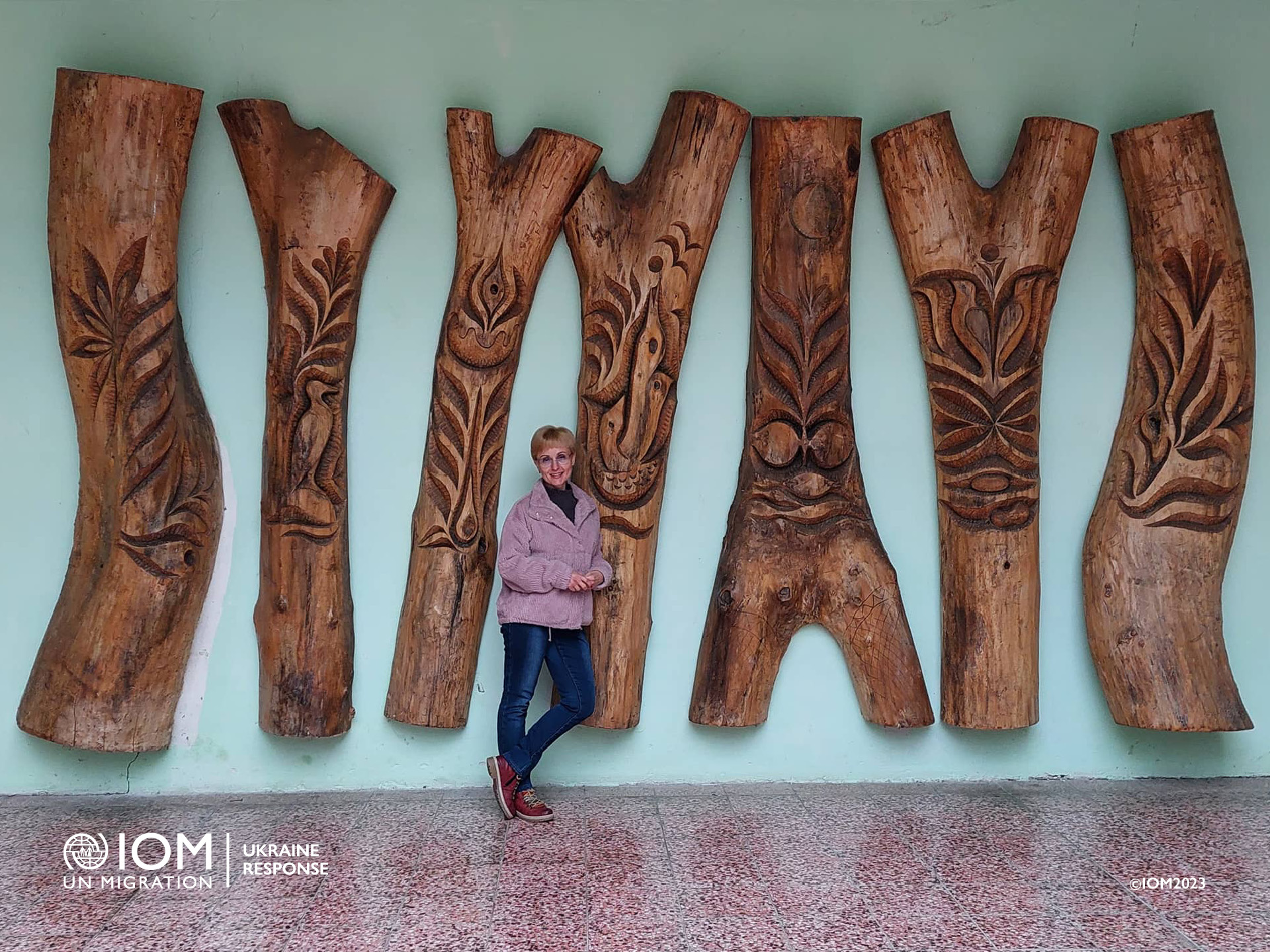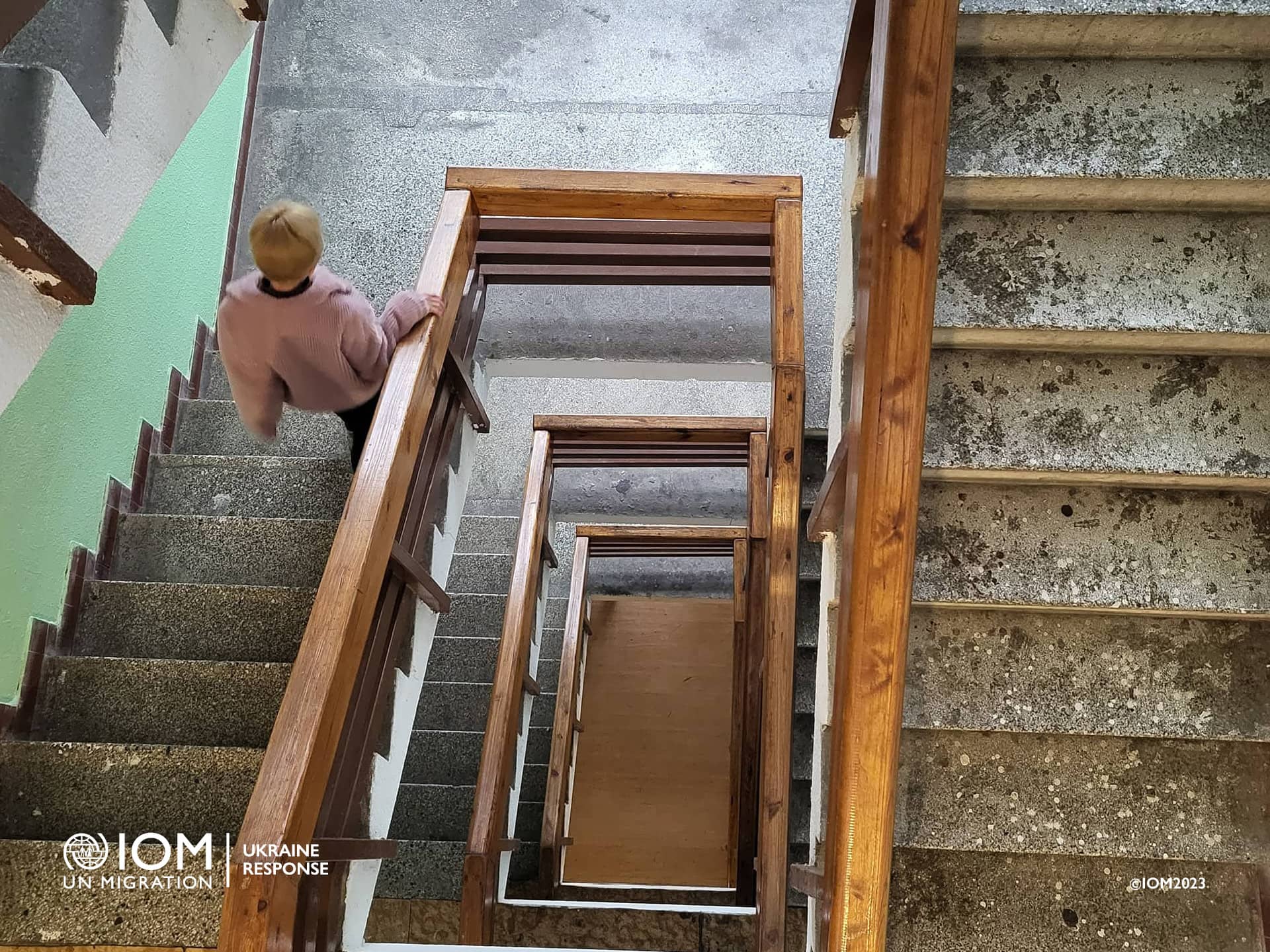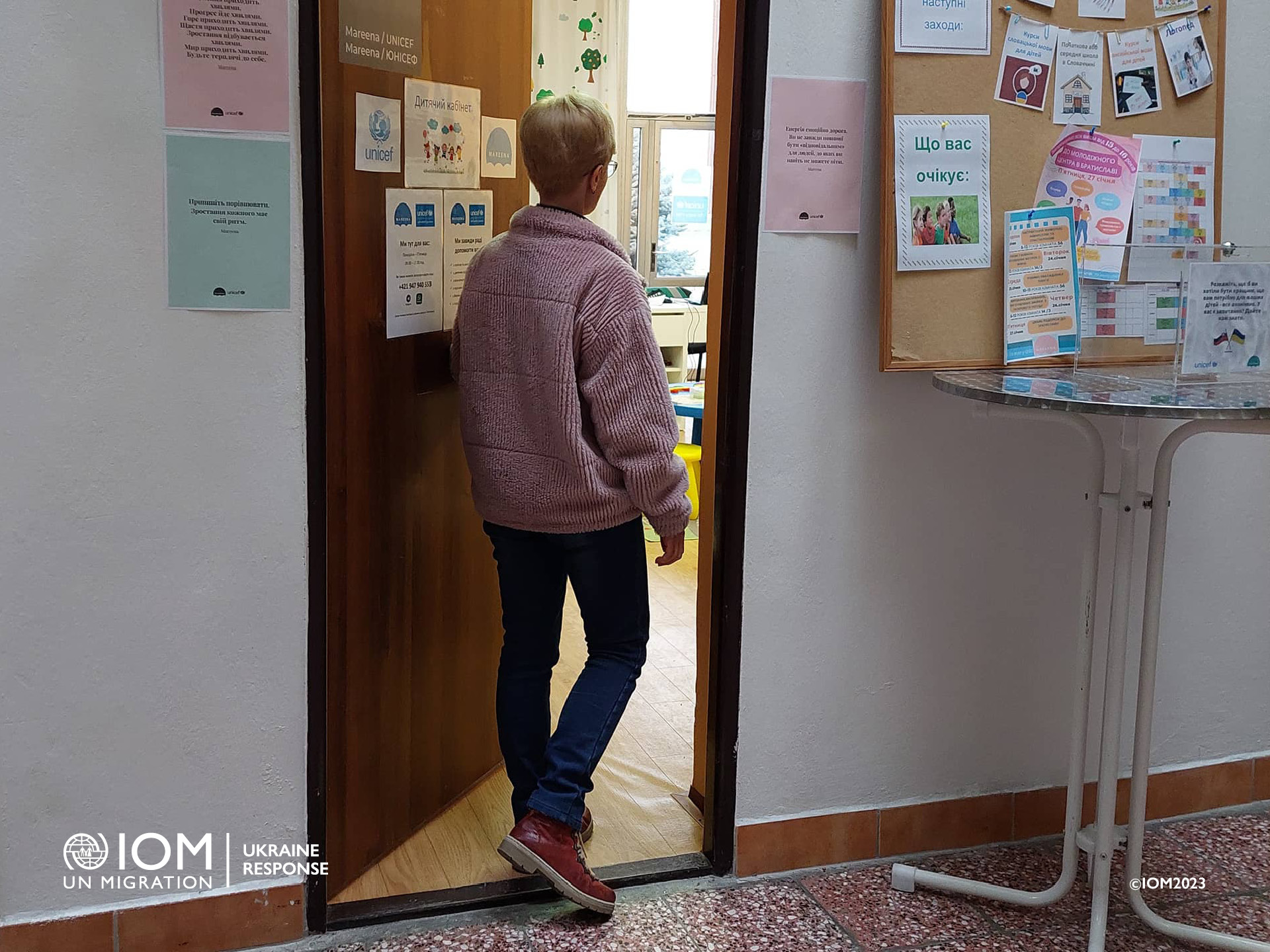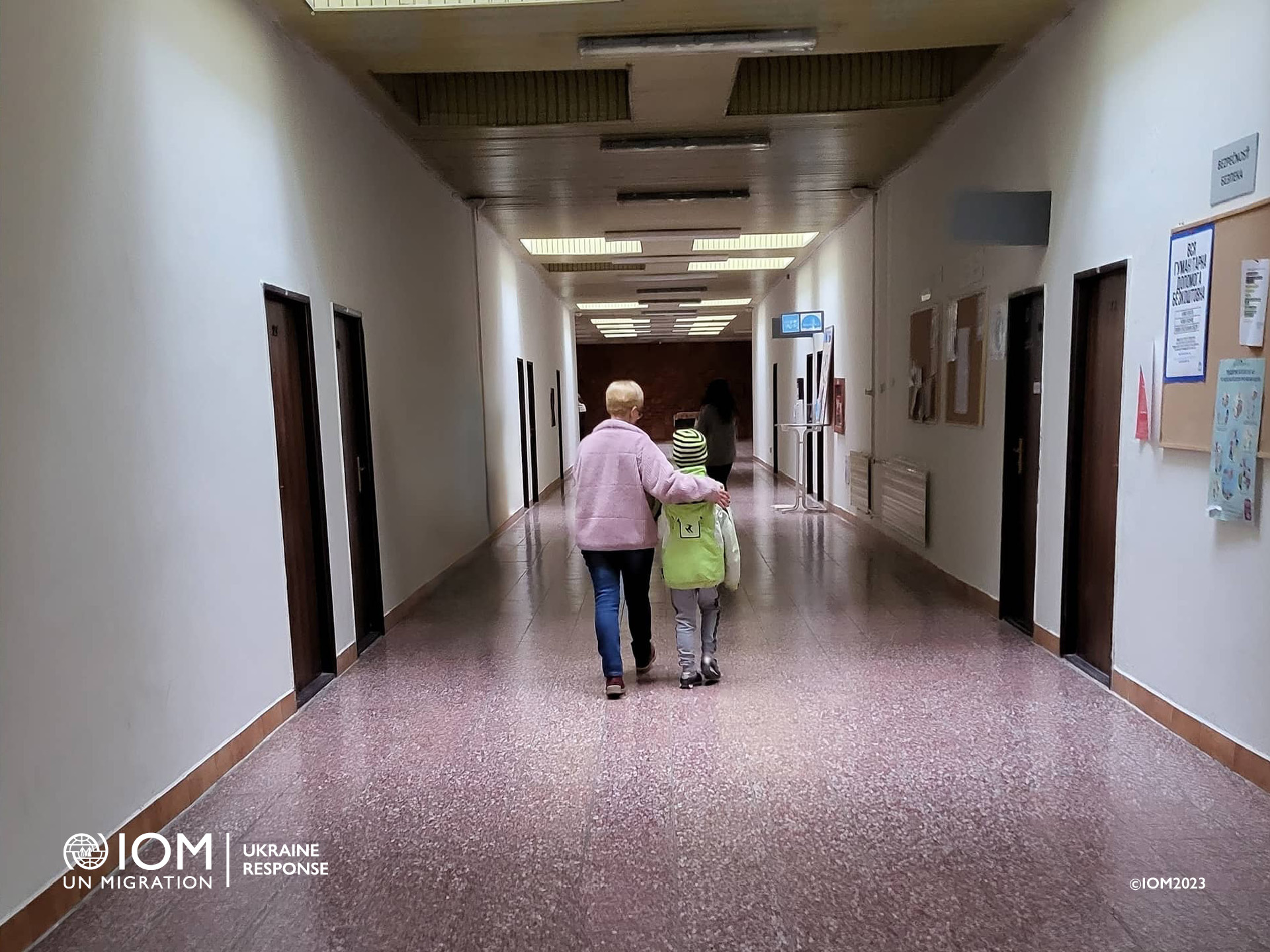“I got pregnant with my son just after my final exam for my bachelor’s degree,” Yulia explains in fluent English. “The baby was literally a gift to me.”

Yulia is among 900 Ukrainian refugees with temporary protection status residing in the Humanitarian Centre in Gabčíkovo, Slovakia. Photo © International Organization for Migration (IOM) 2023 /Júlia Kováčová.
A graduate of Chinese and English language studies, Yulia lived in Mykolaiv, a city of half a million people in southern Ukraine known for its shipbuilding industry. She taught English and worked as an assistant at Kyiv University’s South Slavonic Academia. Keen on fulfilling her long-term dream of studying psychology, she also took classes at Mykolaiv University.
Yulia had been close to finishing her master’s degree when the breakout of the full-scale war in Ukraine in February 2022 put a stop to her plans.

Yulia taught English and worked as an assistant at Kyiv University South Slavonic Academia. She wanted to finish her Master’s degree in psychology with her eye set on criminology until the war put an end to her plans. Photo © International Organization for Migration (IOM) 2023 / Júlia Kováčová.
Although the town of Mykolaiv was not immediately bombed, the “horrible sound of missiles” resounded menacingly across the area. After fighting erupted in the town center involving Russian soldiers, Yulia began to think about leaving.
“We had a ritual with my son when we lived in Mykolaiv,” explains Yulia. Every night, before her son fell asleep, they lay in bed together and talked. “About everything and nothing. He would always start with ‘Mum, you know....’. And I remember, after the war started, when I would kiss him good night and leave his room, I would always say goodbye to him in my thoughts,” adds Yulia, in a cracking voice. She could not be sure she would see him again the next morning.
The thought of losing her son became so unbearable that she decided to leave despite her son’s reluctance to give up his life and leave his dad and friends behind.
By March 2022, Mykolaiv was constantly being shelled. Located on the way to Odessa, the city is key to access and control of Ukraine’s coast. Yulia’s mother, Inna, lived in Balakleya, a town close to Kharkiv, which was shelled with cluster bombs. Inna spent long periods hidden in her cellar and no one could reach her for days. Yet, at first, she also did not want to leave.
On 9 March 2022, Yulia left Mykolaiv with her son in a marshrutka, a private minibus popular in the country, organized by volunteers. They boarded a train from Odessa to Uzhhorod, not knowing where to flee to. Finally, she chose to join acquaintances headed to Slovakia. “It was a random decision,” Yulia says.
Volunteers helped her get to and across the Slovak-Ukrainian border as she was carrying heavy luggage and travelling with a nine-year-old child. “Leaving Ukraine, I felt like I had betrayed my country,” she confesses. “I even called my family saying that I was sorry but needed to leave. I felt horrible.”
After a four-day journey, Yulia found herself in the Humanitarian Centre in Gabčíkovo, Slovakia. It was mid-March.
By the end of the month, Yulia’s mother had managed to get to Kharkiv. “It was a miracle that she had not been killed when passing through all the check points,” continues Yulia. From there, her mother fled to Switzerland. Feeling alone in a foreign country, she wanted to reunite with her daughter and grandson in Slovakia. Thanks to the support of the International Organization for Migration (IOM) and other organizations, Inna finally joined Yulia in the Humanitarian Centre Gabčíkovo in mid-June. The process took about three months.
There are more than 900 Ukrainian refugees with temporary protection status in the Humanitarian Center in Gabčíkovo. IOM has been present since March 2022 to assist them with information, including legal and labour counselling, protection and capacity-building services. The Organization regularly organizes community activities and Slovak language courses and distributes emergency relief items such as blankets, clothes, footwear, and kitchen and hygiene kits to Ukrainians staying at the Centre.
Initially, Yulia thought she would stay in Gabčíkovo for two weeks. Two weeks turned into one month. Then Easter, the beginning of summer. “The idea of staying for the whole summer sounded terrible and even inconceivable to me,” recalls Yulia. Soon she will have been in Slovakia for almost one year.

Yulia’s stay in Slovakia is approaching the one-year mark. For now, she is not able to think about the future and lives for the moment. Photo © International Organization for Migration (IOM) 2023 / Júlia Kováčová.
After their arrival, Yulia’s son started attending a Slovak school in the town of Šamorín, close to Gabčíkovo. In parallel, he continued his online education in Ukraine. Yulia also had the chance to work as an interpreter for a Canadian journalist of Slovak origin reporting on Ukrainian refugees in the Humanitarian Centre in Gabčíkovo. Later, she was offered a job by the non-governmental organization “Mareena” located in the same center. “It was a miracle for me,” smiles Yulia.

For now, Yulia is not able to think about the future, she lives for the moment. “I decided to live in the present and just be happy here.” She says that she is grateful for everything that the Slovaks have done and continue to do for Ukraine. “And I believe that our country will win. I’m absolutely sure,” she concludes.
Written by Jana Hönschová, IOM Slovakia / Gabčíkovo
 Slovenčina
Slovenčina
 Українська (Україна)
Українська (Україна)
 English
English
